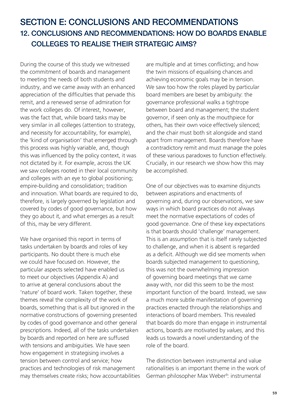
59
During the course of this study we witnessed
the commitment of boards and management
to meeting the needs of both students and
industry, and we came away with an enhanced
appreciation of the difficulties that pervade this
remit, and a renewed sense of admiration for
the work colleges do. Of interest, however,
was the fact that, while board tasks may be
very similar in all colleges (attention to strategy,
and necessity for accountability, for example),
the 'kind of organisation' that emerged through
this process was highly variable, and, though
this was influenced by the policy context, it was
not dictated by it. For example, across the UK
we saw colleges rooted in their local community
and colleges with an eye to global positioning;
empire-building and consolidation; tradition
and innovation. What boards are required to do,
therefore, is largely governed by legislation and
covered by codes of good governance, but how
they go about it, and what emerges as a result
of this, may be very different.
We have organised this report in terms of
tasks undertaken by boards and roles of key
participants. No doubt there is much else
we could have focused on. However, the
particular aspects selected have enabled us
to meet our objectives (Appendix A) and
to arrive at general conclusions about the
'nature' of board work. Taken together, these
themes reveal the complexity of the work of
boards, something that is all but ignored in the
normative constructions of governing presented
by codes of good governance and other general
prescriptions. Indeed, all of the tasks undertaken
by boards and reported on here are suffused
with tensions and ambiguities. We have seen
how engagement in strategising involves a
tension between control and service; how
practices and technologies of risk management
may themselves create risks; how accountabilities are multiple and at times conflicting; and how
the twin missions of equalising chances and
achieving economic goals may be in tension.
We saw too how the roles played by particular
board members are beset by ambiguity: the
governance professional walks a tightrope
between board and management; the student
governor, if seen only as the mouthpiece for
others, has their own voice effectively silenced;
and the chair must both sit alongside and stand
apart from management. Boards therefore have
a contradictory remit and must manage the poles
of these various paradoxes to function effectively.
Crucially, in our research we show how this may
be accomplished.
One of our objectives was to examine disjuncts
between aspirations and enactments of
governing and, during our observations, we saw
ways in which board practices do not always
meet the normative expectations of codes of
good governance. One of these key expectations
is that boards should 'challenge' management.
This is an assumption that is itself rarely subjected
to challenge, and when it is absent is regarded
as a deficit. Although we did see moments when
boards subjected management to questioning,
this was not the overwhelming impression
of governing board meetings that we came
away with, nor did this seem to be the most
important function of the board. Instead, we saw
a much more subtle manifestation of governing
practices enacted through the relationships and
interactions of board members. This revealed
that boards do more than engage in instrumental
actions, boards are motivated by values, and this
leads us towards a novel understanding of the
role of the board.
The distinction between instrumental and value
rationalities is an important theme in the work of
German philosopher Max Weber9: instrumental
SECTION E: CONCLUSIONS AND RECOMMENDATIONS
12. CONCLUSIONS AND RECOMMENDATIONS: HOW DO BOARDS ENABLE
COLLEGES TO REALISE THEIR STRATEGIC AIMS?